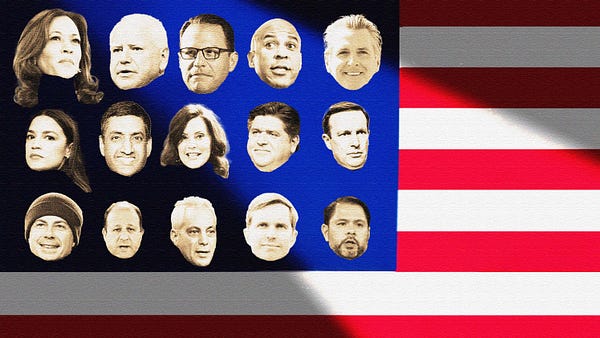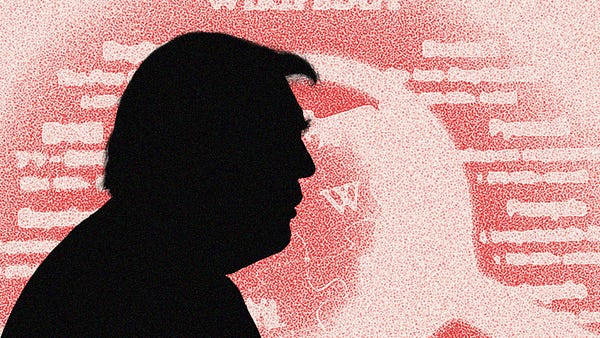
The Free Press

Questions are being raised about the Secret Service, after it failed to protect former president Donald J. Trump from an assassination attempt. Influential Americans, from lawmakers to commentators, have drawn a link between the almost-catastrophic security breach and the Service’s new DEI policies—specifically, the attempt to increase the number of women it employs. Two videos in particular have drawn ire on social media—much of it directed at female agents who appear to be incompetent.
One shows a group of agents huddling around the former president after the bullet grazed him, trying to protect him. The human chain is mostly made up of male agents as tall as or taller than the former president, who are therefore able to shield him. From the front, however, Trump is exposed—because of a female agent, who is much shorter and smaller than her male colleagues. It doesn’t help that she can be seen adjusting her sunglasses.
Another video shows female agents fumbling with their firearms, rearranging their jackets, looking around with uncertainty, and moving around shambolically, as they’re attempting to safely evacuate Trump from the scene.
These signs of incompetence have been linked to the policies of the agency’s current director, Kimberly Cheatle, who was appointed by President Joe Biden in 2022. Last May, she claimed in a CBS interview that she would aim to “attract diverse candidates,” and particularly wanted to increase the number of women in the Secret Service. Today, 24 percent of agents are female; she wants to raise that figure to 30 percent by the year 2030.
The day after the foiled assassination attempt, the House launched a “full investigation” into the shooting, led by Rep. James Comer (R-KY), chairman of the House Oversight Committee. He has already formally requested Cheatle testify, on July 22.
But at the time of the shooting, his committee had already begun investigating the Secret Service. Concerns that a focus on DEI is damaging effectiveness and morale have been swirling for months now—and were brought to a head by an incident that took place on April 22 of this year.
It involved a female Secret Service agent, identified as Michelle Herczeg, who was part of Vice President Kamala Harris’s protective detail. While on duty, Herczeg became erratic and assaulted a superior. She was subsequently removed from her duties, but it then emerged that not only did Hercezg lack the experience expected of agents who protect the vice president, she had also been mired in controversy.
In 2016, Herczeg—then a Dallas police officer—had filed a gender discrimination lawsuit against the city, claiming more than $1 million in damages, which was dismissed by a trial court. (An appellate court subsequently affirmed the decision and denied her a rehearing in 2022.) After her assault of a superior officer, Ronald Kessler, a former Washington Post reporter who has written extensively on the Secret Service, claimed her failed lawsuit should have disqualified her from being hired by the agency, because her record wasn’t “pristine.”
Not coincidentally, the House Oversight and Accountability Committee launched its investigation into the Secret Service a month later, on May 30, 2024. In a letter to Director Cheatle, informing her of the investigation, Rep. Comer referenced the incident. In it, he cites concerns that there are “potential vulnerabilities” within the agency, which may be “preventing it from fulfilling its mission to ensure the safety and security of its protectees”—including the president, former presidents, and major presidential candidates.
Comer’s letter also cited an anonymous petition dated May 6, 2024, which appears to have been written by Secret Service agents, and alleges “double standards between males and females.” It criticizes “the Agency’s false narrative that promotions are based on a ‘merit based system,’ when in reality the promotions have been based on alleged ‘Diversity, Equity, and Inclusion (DEI).’ ”
This, according to the anonymous petition, has led to a “number of serious breaches in security.” It calls on Director Cheatle to resign, or be fired.
After the news of the petition became public, Secret Service Chief of Communications Anthony Guglielmi trashed the concerns raised, slamming the anonymous petitioners for not embodying the agency’s “values of service over self.”
To be fair, the Secret Service’s struggle with recruitment and retention goes far beyond DEI. A 2021 report highlights a high attrition rate, related to how stressful the work is, with about 8 percent of the workforce quitting every year. As a result, 16 percent of special agents—the type of agents protecting Trump—have less than three years’ job experience.
But whatever the cause of its crisis, the Secret Service needs to sort it out, and fast. The Americans who have sat, or are campaigning to sit, in the White House must be able to safely speak to the public. That they do so is nothing more than a foundation of our democracy.
Rupa Subramanya is a reporter for The Free Press. Follow her on X @rupasubramanya and read her piece “They’re Voting for Trump to ‘Save Democracy.’”
To support The Free Press, become a Free Press subscriber today:














MS. Cheatle mentioned the reason there was not agent placed on the roof: fall of the roof concern. The fact that she even considered this valid justification is astonishing. Really? Special agent is in danger of falling of the roof? this safety precaution worth risking failure of mission? The super soldiers of Secret Service are that vulnerable? Shame on her and the whole Secret Service. You made our country the laughingstock of the world.
I think there should at the minimum be a height requirement. It is only practical.